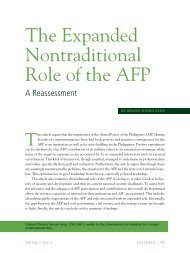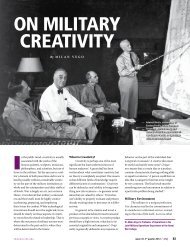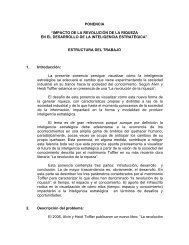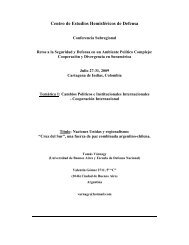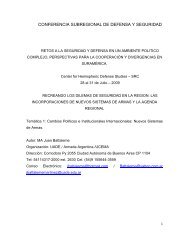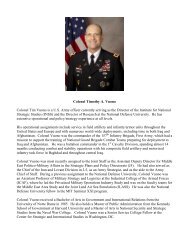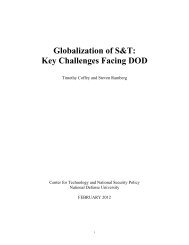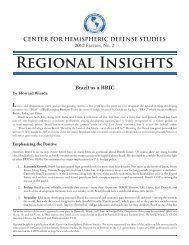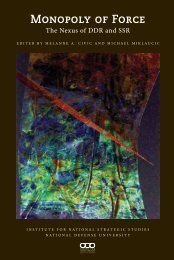On the Nature of Military Theory - National Defense University
On the Nature of Military Theory - National Defense University
On the Nature of Military Theory - National Defense University
You also want an ePaper? Increase the reach of your titles
YUMPU automatically turns print PDFs into web optimized ePapers that Google loves.
26 TOWARD A THEORY OF SPACEPOWER<br />
essential role <strong>of</strong> <strong>the</strong>ory was to aid <strong>the</strong> commander in his total learning,<br />
which syn<strong>the</strong>sized study, experience, observation, and reflection into a<br />
coherent whole, manifested as an ever-alert, perceptive military judgment.<br />
There is, however, ano<strong>the</strong>r view <strong>of</strong> <strong>the</strong> utility <strong>of</strong> <strong>the</strong>ory, most famously<br />
articulated by Baron Antoine Henri de Jomini, Clausewitz’s chief competitor<br />
in this arena. Jomini indeed believed in <strong>the</strong> power <strong>of</strong> positive teaching.<br />
Although he was prepared to admit that war as a whole was an art,<br />
strategy—<strong>the</strong> main subject <strong>of</strong> his work—was “regulated by fixed laws<br />
resembling those <strong>of</strong> <strong>the</strong> positive sciences.” 30 Following this point-counterpoint<br />
formula again, he conceded that bad morale and accidents could<br />
prevent victory, but:<br />
These truths need not lead to <strong>the</strong> conclusion that <strong>the</strong>re can be<br />
no sound rules in war, <strong>the</strong> observance <strong>of</strong> which, <strong>the</strong> chances<br />
being equal, will lead to success. It is true that <strong>the</strong>ories cannot<br />
teach men with ma<strong>the</strong>matical precision what <strong>the</strong>y should do<br />
in every possible case; but it is also certain that <strong>the</strong>y will always<br />
point out <strong>the</strong> errors which should be avoided; and this is a<br />
highly important consideration, for <strong>the</strong>se rules thus become,<br />
in <strong>the</strong> hands <strong>of</strong> skillful generals commanding brave troops,<br />
means <strong>of</strong> almost certain success. 31<br />
This fundamental belief in <strong>the</strong> efficacy <strong>of</strong> prescriptive <strong>the</strong>ory led<br />
Jomini to formulate his <strong>the</strong>ory itself much differently than Clausewitz. At<br />
<strong>the</strong> epicenter <strong>of</strong> Clausewitz’s <strong>the</strong>ory, we find a trinity <strong>of</strong> <strong>the</strong> elemental<br />
forces <strong>of</strong> war—violence, chance, and reason—acting on each o<strong>the</strong>r in multifarious<br />
ways, whose dynamics <strong>the</strong> statesman and commander must thoroughly<br />
consider before deciding whe<strong>the</strong>r to go to war and how to conduct<br />
it. 32 Jomini’s central proposition consists <strong>of</strong> a series <strong>of</strong> four maxims about<br />
strategy that he summarized as “bringing <strong>the</strong> greatest part <strong>of</strong> <strong>the</strong> forces <strong>of</strong><br />
an army upon <strong>the</strong> important point <strong>of</strong> a <strong>the</strong>ater <strong>of</strong> war or <strong>of</strong> <strong>the</strong> zone <strong>of</strong><br />
operations.” 33 Jomini’s principle-based approach to <strong>the</strong>ory has had great<br />
endurance over <strong>the</strong> years. It perhaps found its most complete expression in<br />
J.F.C. Fuller’s The Foundations <strong>of</strong> <strong>the</strong> Science <strong>of</strong> War, a treatise whose nine<br />
didactic imperatives, each expressed as a single word or short phrase, continue<br />
to resonate in contemporary doctrinal manuals. 34<br />
Clausewitz’s and Jomini’s views <strong>of</strong> <strong>the</strong>ory were not mutually exclusive.<br />
Jomini addressed some <strong>of</strong> <strong>the</strong> wider considerations <strong>of</strong> policy central<br />
to Clausewitz, particularly in <strong>the</strong> opening chapter <strong>of</strong> The Art <strong>of</strong> War. 35 And<br />
Clausewitz occasionally engaged in formulaic statements, perhaps most<br />
notably in his observation that “destruction <strong>of</strong> <strong>the</strong> enemy force is always



